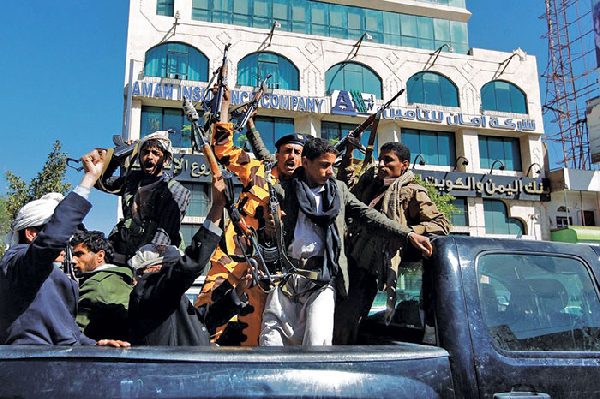
|
| Houthi rebels drive through Sanaa amid rival protests for and against them, Oct. 11. |
SANAA — Al-Qaeda-linked fighters seized a large army base in a dawn attack in southern Yemen on Thursday, militants and residents said, hours after the United Nations warned that the country was on the brink of civil war.
The base in the southern province of Shabwa, housing a brigade of up to 2,000 government soldiers, fell after several hours of heavy clashes, residents and local news sites said.
The al Qaeda-affiliated Ansar al-Sharia said on Twitter it had set off a suicide bomb at the gate and imprisoned some of the troops.
Al-Qaeda and other extremist militants have stepped up attacks since rival Iranian-backed fighters from the north seized the capital in September and started expanding across the country.
The Houthis have sidelined the central government and have clashed with Sunni tribesmen in Yemen, which borders oil giant Saudi Arabia.
“We believe the situation is very dangerous. Yemen is on the brink of civil war,” Jamal Benomar, the U.N. special envoy to Yemen, said in an interview with television channels al Arabiya and al-Hadath late on Wednesday.
Benomar’s grim briefing to the U.N. Security Council followed a similar statement from U.N. Secretary-General Ban Ki-moon that “Yemen is collapsing before our eyes” and the international community should not stand by and watch.
The U.N. secretary-general also warned of “increasing secessionist tendencies” in southern Yemen, which was once a separate nation, and of a humanitarian crisis where 61 percent of the country’s population is in need of aid.
“We must do everything possible to help Yemen step back from the brink and get the political process back on track,” Ban said. He said the first focus is on “helping the Yemeni people to re-establish a legitimate government authority as soon as possible.”
He accused all sides of contributing to the political and economic turmoil and called for more talks.
Sanaa witnessed opposing protests supporting and denouncing Houthis last week.
An official from the town of Beyhan near the seized army base said residents feared the Houthis would now move in to confront the Ansar al-Sharia fighters.
“We are scared this (the capture of the army base) is going to be used as a justification for a Houthi attack and that they will take over Shabwa with the help of the army,” the official said, refusing to be identified.
Ansar al-Sharia said after bombing the entrance of the base, it took control of three guard towers and one tank.
“By approximately eight o’clock in the morning, the mujahideen had imprisoned most of the soldiers inside,” the group said on Twitter.
Yemen’s government was a key ally of Washington in its war on al-Qaeda. The United States has been carrying out drone strikes on militant targets for more than a decade, many in the south.
But the United States, as well as Britain and France, closed their embassies in the capital Sanaa on Wednesday, citing security concerns since the Houthi takeover.
The Pentagon on Tuesday acknowledged that Yemen’s political unrest was impacting its counter-terrorism capabilities but said it was still training some Yemeni forces and could still carry out operations inside the country against al-Qaeda militants.
“There’s no question as a result of the political instability in Yemen that our counter-terrorism capabilities have been … affected,” Rear Admiral John Kirby, a Pentagon spokesman, told a news briefing.
“As I stand here today, we continue to conduct some training. We continue to have the capability – unilaterally if need be – of conducting counter-terrorism operations inside Yemen.”
The Houthi takeover of the central government in Yemen puts the United States in an uncomfortable place. The Iranian-backed rebels are adversaries of the United States, but they remain the most powerful opponent of al-Qaeda in Yemen.
“The United States is taking a programatic approach on the situation in Yemen,” Lebanese writer Nabil Haissam wrote in an analysis for The Arab American News. “The Americans have denounced the Houthis in Yemen, but stressed the importance of working with anti-terrorism forces in Yemen.”
He added that the United States finds itself where it has to accept Houthi movement, which hold “Death to America” as a slogan, in order to quell the rise of al-Qaeda.
Yemen is also home to Al-Qaeda in the Arabian Peninsula (AQAP), one of the global network’s most active arms that has carried out attacks abroad. Supporters of the AQAP pledged allegiance to the “Islamic State”, according to a Twitter message retrieved by U.S.-based monitoring group SITE.
-Reuters, TAAN






Leave a Reply